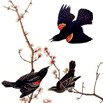Center, Internet, Wildlife Damage Management

Bird Control Seminars Proceedings
Document Type
Article
Date of this Version
September 1970
Abstract
Bird damage to crops in Latin America--from Mexico to Venezuela and Colom¬bia-is chiefly caused by fringillids, icterids, and psittids (De Grazio and Besser, 1970). Damage to grains such as rice and grain sorghum by various fringillids-sometimes re¬ferred to as "chisguas" by local landowners-is especially troublesome. The fringillid most often implicated in major problems is the dickcissel (Spiza americana).
Dickcissels are not known to cause serious damage problems within their breed¬ing range, which is chiefly the prairies and hay meadows of the central United States. In August, small postbreeding flocks congregate, and by September and October these coalesce into much larger feeding and roosting aggregations as the birds migrate through Central America, reaching their wintering grounds in Colombia, Venezuela, Trinidad, Guyana, and Surinam in November and December (Ffrench, 1967). The return to breeding areas apparently begins in March and peaks in April. The spring migration is much more rapid than the fall migration, as most dickcissels are back on their breeding territories in May (Bent, 1968:158-191).
It may seem strange that the dickcissel, a relatively small bird of about 25 grams, can cause such large problems. However, the quelea (Quelea quelea), which causes extremely severe losses in Africa, weighs only about 17 grams. Seedeaters of the genus Sporophila cause problems in crops in Latin America, and one of the commonest, the ruddy-breasted seedeater (S. minuta), weighs only about 7 grams.
In the fall, the funneling of the dickcissel population through Central America coincides with the onset of the dry season and the ripening of cultivated grains in this area. In Nicaragua, Koone (1969, personal communication) and Edwards (1969, personal communication) reported thousands of dickcissels attacking rice and grain sorghum plantings. In Costa Rica, Slud (1964) labeled the dickcissel "the supreme pest of the ricefield." Most farmers in Central America have learned not to dally in harvesting their crops or birds, often dickcissels, will "assist" them in the harvest.

